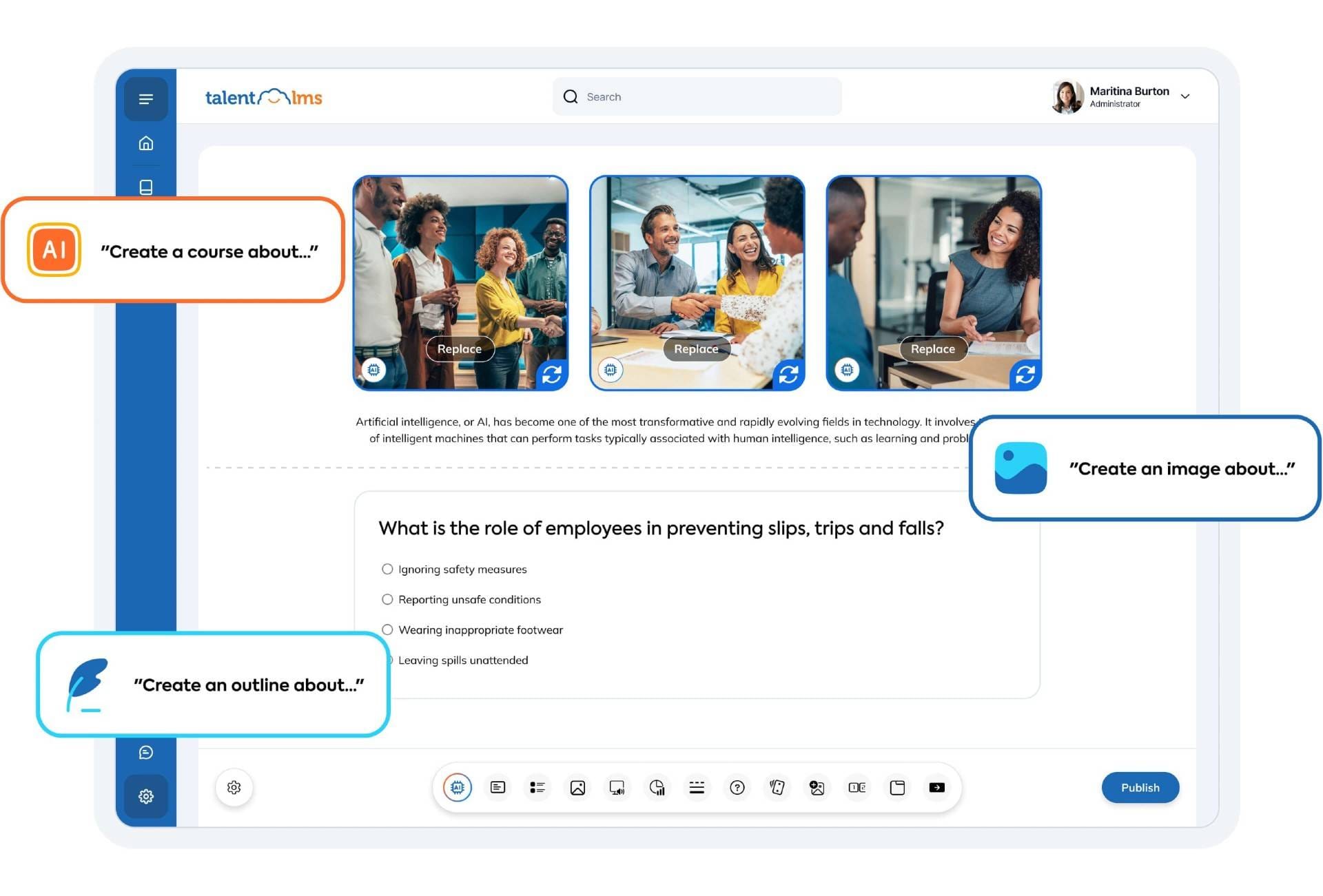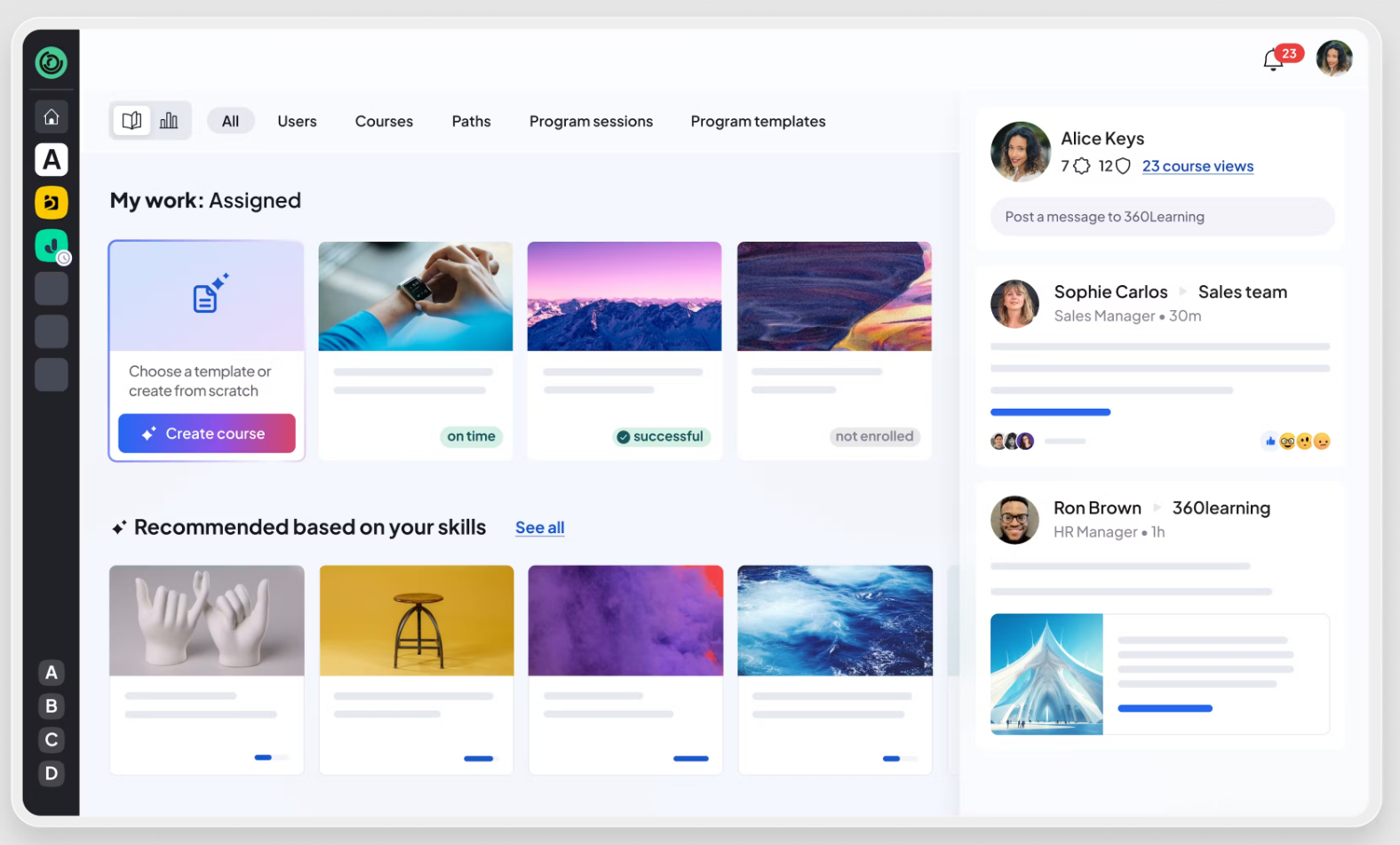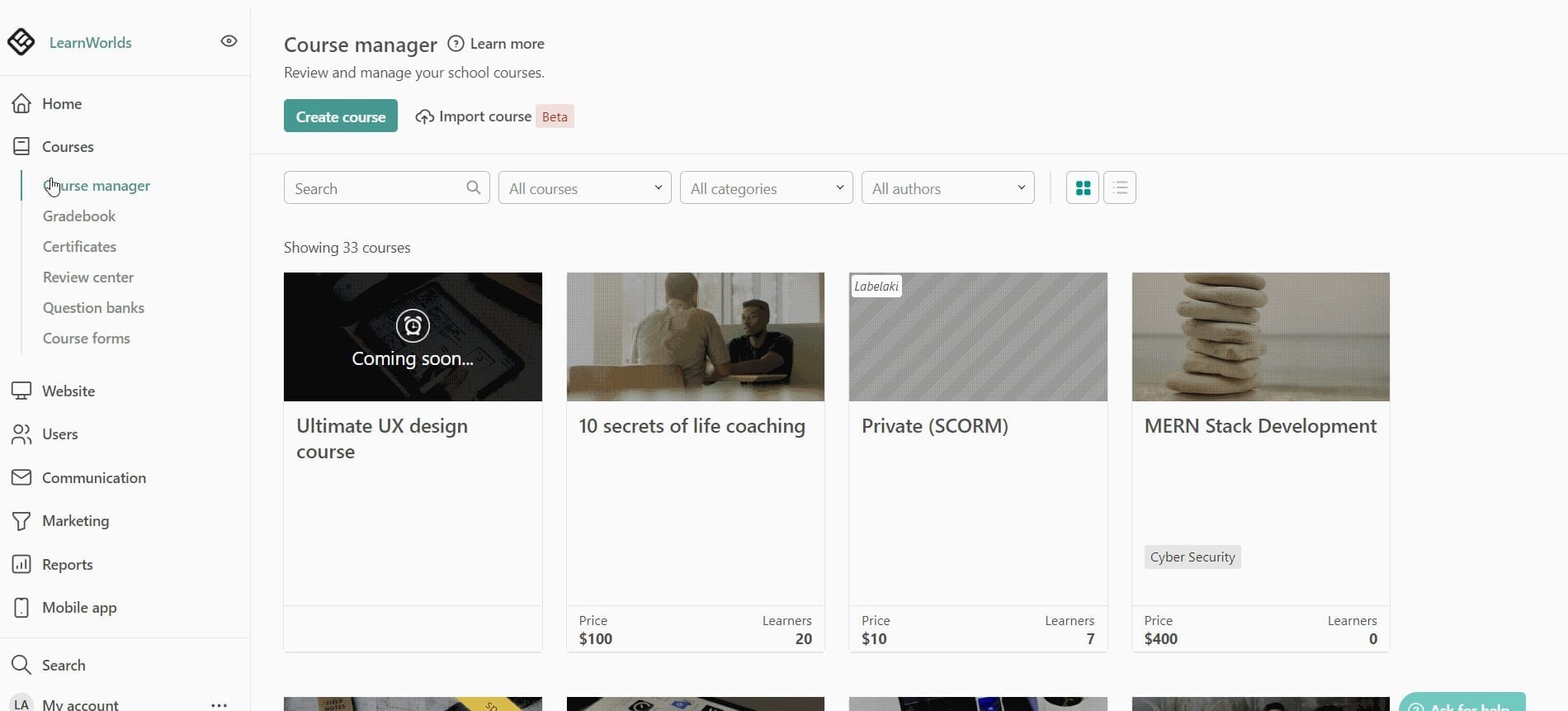
3 Best Learning Management Systems (LMS) [2025]
If your team’s learning still lives in PDFs, scattered slide decks, or one-off Zoom sessions, it might be time for an upgrade. Modern learning management systems (LMS) are specifically designed to avoid that. An LMS is a platform that helps companies deliver and manage training content. An LMS centralizes learning in a way that's trackable, flexible, and easy to scale.
These platforms aren’t new, but in 2025, they’ve become a lot more useful. With remote and hybrid teams becoming the norm, companies need training tools that work across time zones and devices. AI is also stepping in to recommend content and even create personalized learning paths that adjust in real time. Add to that intuitive integrations with your HR systems, and you get a training engine that’s smart and also connected.
In this guide, we’ll break down what to look for in a great LMS, highlight the top platforms leading the way this year, and share practical tips to help you choose the right one for your team.
What to Look for in an LMS
Choosing an LMS has to do with finding a system that actually works for your team, your workflows, and the way your people learn. Here’s what matters most.
- A clean, intuitive user experience: If the platform’s clunky, no one will use it. Look for an LMS that’s easy to manage for both admins and learners. Features like drag-and-drop course builders, smart search, and customizable dashboards can make a big difference.
- Scalability and mobile-friendliness: Your LMS should be able to grow with you. It makes no difference if you’re a 20-person startup or scaling fast, make sure the platform supports multiple user levels, roles, and locations. Bonus: mobile access is a must for remote, frontline, or hybrid teams who aren’t always at a desk.
- AI capabilities that actually help: Some platforms use AI as a buzzword, and others use it to power real learning. Think about personalized course suggestions, automated reminders, and even content made by AI that speaks to the needs of employees. Look for LMS tools that go beyond surface-level AI.
- Integration with your HR software: An LMS shouldn’t live in a silo. Integrations with your HRIS, payroll, performance management, and onboarding tools can optimize workflows and keep your data synced. This also helps HR and managers track training progress in real time.
- Reporting and analytics you can act on: Completion rates are just the start. A strong LMS gives you visibility into learner progress, skills gaps, engagement trends, and compliance status. You should look for platforms that let you make your own reports and dashboards that you can understand without a data analyst.
- Flexible pricing and licensing: Every business has its own training needs and its own budget. Find a pricing model that fits your team size and growth plans. Also, check if features are locked behind higher tiers or if there’s room to scale without major jumps in cost.
Leadership vs. management: What is the difference? →
Top 3 Learning Management Systems for 2025
There’s no shortage of learning platforms out there, but not all of them are built for how teams actually work today. The right LMS should be easy to use, flexible enough to grow with you, and smart enough to keep learners engaged.
Here are some of the top LMS platforms leading the way in 2025. Will start with one that balances speed, AI, and simplicity particularly well:
TalentLMS

Best for: Small and medium-sized businesses that want an LMS that is quick, flexible, and powered by AI.
TalentLMS continues to be a top choice for growing businesses in 2025, especially for teams that want to get up and running quickly without sacrificing depth or customization.
It comes with a clean user interface, solid course management tools, and considerable flexibility whether you're delivering compliance training, onboarding new hires, or building skills-based learning paths. With support for SCORM, xAPI (two communications protocols for tracking learning activity), blended learning, and mobile access, it’s well-equipped for both structured programs and on-the-go learning.
What sets TalentLMS apart in 2025 is its AI-powered course generator and skills-based learning tools. With TalentCraft, its AI course content generator, TalentLMS can generate full courses with a single prompt, while also mapping employee skills and recommending learning paths. This makes the platform ideal for orgs focused on upskilling and internal mobility. And ideal for HR reps that don’t have time to put together courses and need a helping hand.
Users consistently highlight exceptional customer support as a major advantage. For teams dealing with setup or troubleshooting, hands-on guidance (often including helpful screen recordings and step-by-step walkthroughs) has made a real difference.
TalentLMS also integrates really easily with major HR systems like TalentHR and BambooHR, and tools like Zoom, Microsoft Teams, and Salesforce, so training fits naturally into existing workflows. Custom branding, white-labeling options, and multi-language support add even more flexibility for teams working across regions.
Key features:
- AI-powered course and skills tools
- TalentCraft, an AI course content generator
- 1,000+ ready-made courses in TalentLibrary™
- Blended learning, certifications, gamification, assessments
- Custom learning paths and branching (multi-portal setup)
- Detailed reporting, survey engine, and job pathfinding AI
- Native mobile apps (iOS and Android)
- 40+ language options
- Integrations with HR, CRM, and e-commerce platforms
- GDPR-compliant and enterprise-level security
Pricing: TalentLMS currently offers four types of plans:
- Core: $119 for up to 100 users.
- Grow: $229 for up to 500 users.
- Pro: $449 for up to 1,000 users.
- Enterprise: Custom pricing (starts at 1,000 users).
The best part is that you can try the Core, Grow, and Pro plans for free.
360Learning

Best for: Companies that want dedicated support and collaborative learning.
360Learning focuses on collaborative learning. It gives employees the tools to share knowledge, create content, and learn together.
The platform brings in AI features to speed up course creation, suggest skills-based learning paths, and support L&D teams with tools like AI-powered course builders and content recommendations. It also supports multiple languages and branches, which is ideal for global teams.
Users often highlight how easy it is to create courses and the collaborative tools that helped with engagement, like comments, reactions, and peer feedback. On the flip side, some users say the platform could offer more branding options, a better mobile experience, and stronger analytics out of the box. Others note that pricing can be high, and that some features are only available on premium plans.
Key features:
- Collaborative learning with built-in comments and reactions
- AI tools for course creation, skill tagging, and content recommendations
- Mobile app and multi-language support
- Easy to manage across multiple teams or regions
- Effective support and onboarding help
Pricing: 360Learning offers two options:
- Team Plan: $8 per registered user/month (up to 100 users)
- Business Plan: Custom pricing.
LearnWorlds

Best for: Companies that sell training programs or need an all-in-one platform that can be easily customized and has good customer service.
LearnWorlds is a versatile LMS built for businesses training employees, customers, or partners, and also for companies selling courses online.
Many users highlight the helpful customer service, intuitive platform, and the fact that it’s fully customizable with no transaction fees. That said, LearnWorlds isn’t the most beginner-friendly option. Some users mention a steep learning curve, and a few find the default templates a bit limiting or clunky. Its community and social features are also less developed than those of more collaborative platforms. Still, for organizations that need control, branding, and the ability to scale or sell courses, it delivers good value.
Key features:
- SCORM-compliant with interactive authoring tools
- Fully white-labeled academies & mobile apps
- Built-in website, popup, survey, and form builders
- AI-powered course creation and automation
- Subscriptions, bundles, coupon codes, and payment gateways
- Affiliate program tools and advanced analytics
- Role-based access, tagging, segmentation
- Integrations with your existing tech stack
Pricing:
- Starter Plan: $29/month.
- Pro Trainer Plan: $99/month.
- Learning Center Plan: $299/month
- Corporate: Custom pricing.
How to Choose the Right LMS for Your Business
A feature checklist alone won’t tell you which LMS to pick. Here’s what actually matters:
- Start with your company size and training goals. Smaller teams may prioritize ease of use, fast setup, and lower per-user pricing, while larger organizations might need scalability, advanced permissions, or multilingual support. Consider whether you're training employees only, or also partners, customers, or vendors.
- Look for integration with your core HR systems. To simplify onboarding, performance reviews, or compliance tracking, your LMS should connect with tools like your HRIS, payroll software, or communication platforms.
- Check out their AI capabilities. Modern LMS platforms are embedding powerful AI tools to automate content creation, personalize learning paths, and surface skill insights. These can significantly reduce admin time and improve learner engagement, especially if you’re working with limited L&D resources.
- Test out the support and trial experience. Most platforms, like TalentLMS, offer free trials or demos. Use them to explore the interface, build a sample course, and test learner experiences. Pay attention to the quality of onboarding materials and how responsive their support team is (these are often make-or-break for long-term success).
3 Best HR Automation Tools to Save Time (And Money) [2025] →
LMS Trends to Watch in 2025
LMS platforms are quickly changing to keep up with changes in technology. There are a lot of new ideas coming up in the learning space in 2025 and for 2026. Here are five trends that are influencing how companies deliver training:
AI-generated learning paths are becoming a standard feature. They help organizations automate course recommendations based on employee roles, skill gaps, and performance data. This saves time for admins and also creates a more personalized experience for learners.
Gamification is also gaining traction, with badges, leaderboards, and challenges making training more engaging, especially for younger, remote, or hybrid teams. When done right, gamification can significantly improve motivation and course completion rates.
Microlearning continues to rise in popularity. Short, focused lessons that can be consumed in under 10 minutes help busy employees stay on track without disrupting their day. Many LMS platforms now support mobile-first microlearning modules designed for learning in the flow of work.
Analytics-driven personalization goes hand-in-hand with AI. LMS tools are getting better at using real-time data to adapt content delivery and flag at-risk learners.
Finally, expect to see deeper integrations with HR systems. Integrations make it easier for learning, performance, onboarding, and career growth to all work together in a single platform, with a single set of analytics. The more connected your tools are, the easier it is to scale learning and track its positive effects across the employee lifecycle.
Use Learning Management Systems that Integrate with your HR Software
Since there are so many good LMS platforms out there, the best way to find the right one for you is to try them out for yourself. Look beyond features. Thoughtfully consider how each system fits into your workflow, helps you reach your training goals, and works with the HR tools you already have.
A great place to start is with a hands-on trial. Most top LMS platforms offer demos or free versions, so you can tour their UI, test integrations, and see how well they align with your training strategy. It needs to be easy to integrate with the HR tools you already have, support the content formats you ask for, and give you reports that can really help your business. Also, make sure the pricing is affordable from the get-go and that their plans scale up.
TalentLMS is a leading option for small to midsize businesses looking for a flexible, intuitive platform that supports everything from self-paced learning to instructor-led sessions. And when you connect it with TalentHR through its TalentLMS integration, you get full visibility into how learning connects with performance, engagement, and growth.
Together, TalentLMS + TalentHR bundle:
- An industry-tested AI course content creator and many AI policy generators
- An effective employee training and management experience
- Real-time insights into learning progress and HR metrics
- AI-assisted tools that simplify admin
- Easy setup, simple pricing, and no-nonsense usability so that anyone in any org can use them
Try both platforms today and see how they work together to support your people. Sign up for TalentHR and start free to try its core HR features and AI tools, no credit card required.

![3 Best HR Automation Tools to Save Time (And Money) [2025]](/content/images/size/w600/2025/07/3-Best-HR-Automation-Tools--2025-.png)
